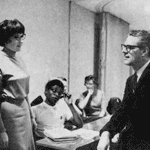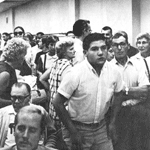| Counselor Phil Layne and Oshkosh Human Rights Council members Edith Collins and Priscilla Leith discuss the problem of housing discrimination and the efforts of the Oshkosh Human Relations Council to address them. - 2.1MB mp3 |
Please click a thumbnail for more detail.

Members of the Oshkosh Human Rights Council (Edie Collins and Lynn Ehlenfeldt at left and Professor Martin Gruberg at far right) meet with Reverend Richard Aukema, the director of the Milwaukee Equal Opportunities Center at WSU-O in 1967.

Fair housing supporters leave chambers in quiet demonstration.
Photos courtesy of The Paper of Central Wisconsin.
Although Oshkosh and communities within the neighboring Fox Valley had few African Americans in residence, several local clergymen, educators and housewives banded together in Human Rights Councils and initiated grassroots efforts to confront one of the most important issues in the northern civil rights movement: housing discrimination. Prompted by their concern over local landlords’ refusal to rent to African American college students and the expectation that a small migration of blacks would help alleviate the region’s labor shortage, they pressed their communities and their local governments to incorporate open housing ordinances. With the support and encouragement of the Governor’s Commission on Human Rights, the Oshkosh Human Rights Council (initiated by WSU-O psychology professor Roy C. Dixon-Robinson in May 1964) and Fox Valley Human Rights Council (formed by UW-Fox Valley Center sociology professor and Methodist minister Gilbert James in December 1964) lobbied community organizations, sponsored public forums, conducted surveys, and even attempted to intervene in a dispute involving an Oshkosh barber who refused to cut the hair of African American students at WSU-O.
Resistance to their efforts and their proposals for legislation banning discriminatory housing practices remained strong, however. The influence of realtors who professed strong beliefs in another kind of freedom—namely the freedom of individuals to buy and sell property in an open market—made the battle for open housing very difficult in northern states such as Wisconsin. Even the testimony of Packers coach Vince Lombardi delivered at open housing hearings in Madison could not save a moderate state Equal Housing Opportunity bill from succumbing to the pressure of the Wisconsin Realtors Association in 1965. In Oshkosh, opponents to an open housing ordinance charged that such legislation was the design of “itinerant carpetbaggers” (WSU-O professors in particular) and questioned whether it was possible, as local conservative activist Valeria Sitter put it bluntly, to “legislate against shrinking from a man’s skin…”
Momentum for an open housing ordinance in Oshkosh began to build in 1968 after Wisconsin passed a state open housing law, President Lyndon Johnson signed the Civil Rights Bill of 1968 (mandating minimal protections against housing discrimination), the U.S. Supreme Court ratified Congress’s power to regulate the sale of private property (in the case of Jones v. Mayer Co.), and Milwaukee and cities throughout the state finally instituted the passage of open housing ordinances. Conservative opposition to open housing ordinances still flourished in Oshkosh and the Fox Valley, however. Opponents to open housing in Oshkosh still hoped to avoid the possibility of stiffer local regulations and aimed to dodge the issue of housing discrimination by disposing the contentious issue in the dead of summer, when the WSU-O campus was empty and many of the professors who supported an ordinance were out of town. At a July 8 meeting of the Oshkosh local government, the Oshkosh Common Council, a proposed open housing ordinance was gutted by conservative councilmen.
While editorials from the local liberal newspaper The Paper of Central Wisconsin railed against the Council’s actions, the Oshkosh Human Rights Council and its supporters rallied and eventually found enough votes to push the ordinance through. At a dramatic Common Council meeting on August 1, several hundred ordinance supporters packed Oshkosh City Hall while dozens of WSU-O students picketed outside. After three hours of heated debate, the Council voted 6-1 in favor of an ordinance. The vote left staunch ordinance opponent Leonard Wright fuming. Those clamoring for the rights of blacks, Counsilman Wright told the press, “have created more disunity and hatred in the past month than we’ve had around here in the last 100 years….If [ordinance supporters] think that Oshkosh is such a stinking town, why don’t they go back where they came from.”
